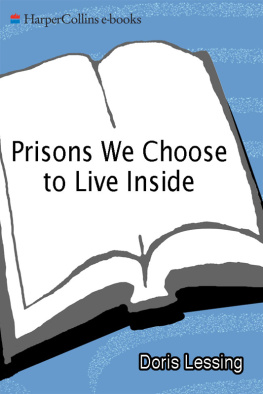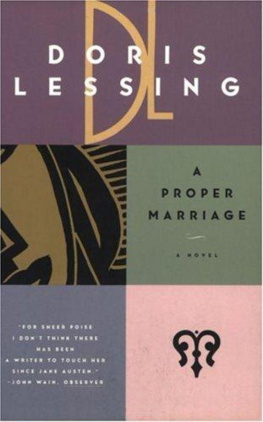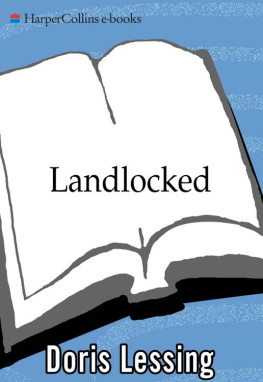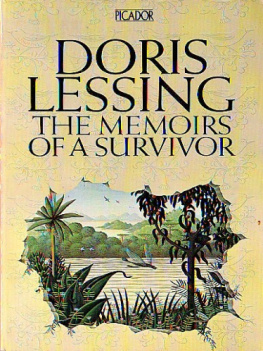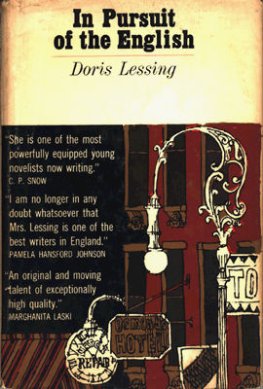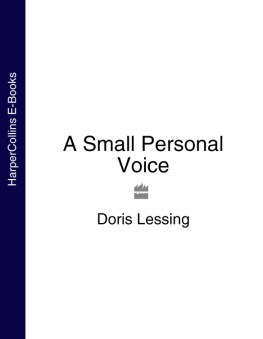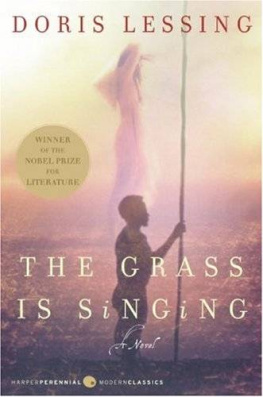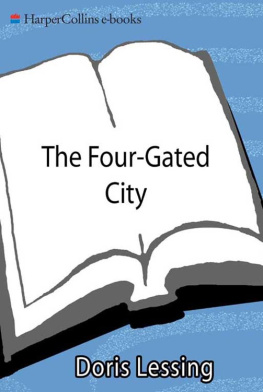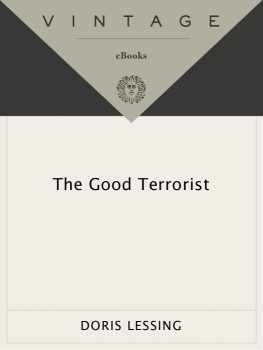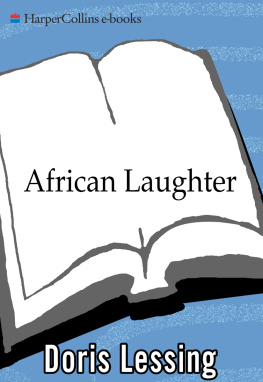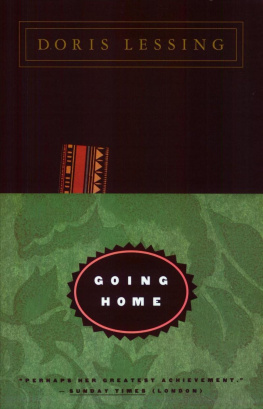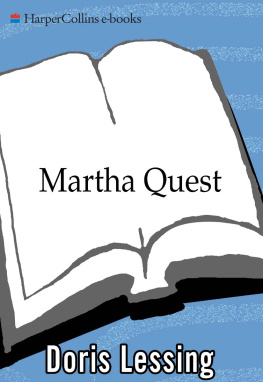Doris Lessing - Prisons We Choose to Live Inside
Here you can read online Doris Lessing - Prisons We Choose to Live Inside full text of the book (entire story) in english for free. Download pdf and epub, get meaning, cover and reviews about this ebook. year: 2013, publisher: Harper Collins, genre: Politics. Description of the work, (preface) as well as reviews are available. Best literature library LitArk.com created for fans of good reading and offers a wide selection of genres:
Romance novel
Science fiction
Adventure
Detective
Science
History
Home and family
Prose
Art
Politics
Computer
Non-fiction
Religion
Business
Children
Humor
Choose a favorite category and find really read worthwhile books. Enjoy immersion in the world of imagination, feel the emotions of the characters or learn something new for yourself, make an fascinating discovery.
- Book:Prisons We Choose to Live Inside
- Author:
- Publisher:Harper Collins
- Genre:
- Year:2013
- Rating:3 / 5
- Favourites:Add to favourites
- Your mark:
- 60
- 1
- 2
- 3
- 4
- 5
Prisons We Choose to Live Inside: summary, description and annotation
We offer to read an annotation, description, summary or preface (depends on what the author of the book "Prisons We Choose to Live Inside" wrote himself). If you haven't found the necessary information about the book — write in the comments, we will try to find it.
Prisons We Choose to Live Inside — read online for free the complete book (whole text) full work
Below is the text of the book, divided by pages. System saving the place of the last page read, allows you to conveniently read the book "Prisons We Choose to Live Inside" online for free, without having to search again every time where you left off. Put a bookmark, and you can go to the page where you finished reading at any time.
Font size:
Interval:
Bookmark:

PRISONS WE CHOOSE TO LIVE INSIDE . Copyright 1987 by Doris Lessing. All rights reserved under International and Pan-American Copyright Conventions. By payment of the required fees, you have been granted the non-exclusive, non-transferable right to access and read the text of this ebook on-screen. No part of this text may be reproduced, transmitted, down-loaded, decompiled, reverse engineered, or stored in or introduced into any information storage and retrieval system, in any form or by any means, whether electronic or mechanical, now known or hereinafter invented, without the express written permission of HarperCollins ebooks.
First Perennial Library edition published 1987.
Copyedited by Diane Conley
Library of Congress Cataloging-in-Publication Data
Lessing, Doris May.
Prisons we choose to live inside.
A Cornelia & Michael Bessie book.
I. Title
PR6023.E833P7 1987 823.914 87-45064
ISBN: 0-06-039074-3 87 88 89 90 91 HC 10 9 8 7 6 5 4 3 2 1
ISBN: 0-06-039077-8 (pbk.) 05 06 HC 20 19
EPub Edition MAY 2013 ISBN: 9780062295019
It would be a good thing if man concerned himself more with the history of his nature than with the history of his deeds.
Friedrich Hebbel
It is useless to close the gates against ideas; they overleap them.
Wenzel Lothar Metternich
To have doubted ones own first principles is the mark of a civilized man.
The mind of a bigot is like the pupil of the eye; the more light you pour upon it the more it will contract.
Oliver Wendell Holmes, Jr .
T HERE WAS ONCE A HIGHLY RESPECTED and prosperous farmer, who had one of the best dairy herds in the country, and to whom other farmers came from all over the southern half of the continent for advice. This was in the old Southern Rhodesia, now Zimbabwe, where I grew up. The time was just after the Second World War.
I knew this farmer and his family well. The farmer, who was Scotch by origin, decided to import a very special bull from Scotland. This was just before science had discovered how to send potential calves from one continent to another by airmail in small packages. The beast in due course arrived, flown in, naturally, and was welcomed by a reception committee of farmers, friends, experts. He cost 10,000. I dont know what that would be now, but it was a very large sum for the farmer. A special home was made for him. He was a massive, impressive animal, mild as a lamb, it was claimed, and he liked to be tickled at the back of his head with a stick held safely at a distance, from behind the bars of his pen. He had his own keeper, a black boy of about twelve. All went well; it was clear the bull would soon become the father of a satisfactory number of calves. He remained an attraction for visitors, who would drive out on a Sunday afternoon to stand about the pen, brooding over this fabulous beast, who looked so powerful and who was so docile. And then he suddenly and quite inexplicably killed his keeper, the black boy.
Something like a court of justice was held. The boys relatives demanded, and got, compensation. But that was not the end of it. The farmer decided that the bull must be killed. When this became known, a great many people went to him and pleaded for the magnificent beasts life. After all, it was in the nature of bulls to suddenly go berserk, everyone knew that. The herd boy had been warned, and he must have been careless. Obviously, it would never happen again to waste all that power, potential, and not to mention moneywhat for?
The bull has killed, the bull is a murderer, and he must be punished. An eye for an eye, a tooth for a tooth, said the inexorable farmer, and the bull was duly executed by firing squad and buried.
Now, as Ive said, this farmer was not some ignoramus, or bumpkin. Moreover, like all his kindthe ruling white minorityhe spent a good deal of time condemning the blacks who lived all around him for being primitive, backward, pagan, and so forth.
But what he had donethis act of condemning an animal to death for wrong-doingwent back into the far past of mankind, so far back we dont know where it began, but certainly it was when man hardly knew how to differentiate between humans and beasts.
Any tactful suggestions along these lines from friends or from other farmers were simply dismissed with: I know how to tell right from wrong, thank you very much.
There is another incident. A certain tree was once sentenced to death, at the end of the last war. The tree was associated with General Ptain, for a time considered Frances saviour, then Frances betrayer. When Ptain was disgraced, the tree was solemnly sentenced and executed for collaborating with the enemy.
I often think about these incidents: they represent those happenings that seem to give up more meaning as time goes on. Whenever things seem to be going along quite smoothlyand I am talking about human affairs in generalthen it is as if suddenly some awful primitivism surges up and people revert to barbaric behaviour.
This is what I want to talk about in these five essays: how often and how much we are dominated by our savage past, as individuals and as groups. And yet, while sometimes it seems as if we are helpless, we are gathering, and very rapidlytoo rapidly to assimilate itknowledge about ourselves, not only as individuals, but as groups, nations, and as members of society.
This is a time when it is frightening to be alive, when it is hard to think of human beings as rational creatures. Everywhere we look we see brutality, stupidity, until it seems that there is nothing else to be seen but thata descent into barbarism, everywhere, which we are unable to check. But I think that while it is true there is a general worsening, it is precisely because things are so frightening we become hypnotized, and do not noticeor if we notice, belittleequally strong forces on the other side, the forces, in short, of reason, sanity and civilization.
And of course I know that as I say these words there must be people who are muttering, Where? The woman must be crazy to see anything good in this mess we are in.
I think this sanity must be looked for in precisely this process of judging our own behaviouras we examine the farmer who executed an animal to make it expiate a crime, or the people who sentenced, and executed, a tree. Against these enormously powerful primitive instincts, we have this: the ability to observe ourselves from other viewpoints. Some of these viewpoints are very oldmuch older perhaps than we realize. There is nothing new in the demand that reason should govern human affairs. For instance, in the course of another study, I came upon an Indian book, a good two thousand years old, a manual for the sensible governing of a state. Its prescriptions are every bit as cool, sensible, rational as anything we could come up with now; nor does it demand any less in the way of justice, even as we understand justice. The reason I am mentioning this book at allit is called the Arthsstra , by the way, and was written by one Kautilya, and is unfortunately hard to come by outside specialist librariesis that this book that seems so unimaginably old talks of itself as the last in a long line of similar books.
It could be said that this is a matter for gloom rather than optimism, that after so many thousands of years of knowing perfectly well how a country should be managed, we are so far from achieving it; butand this is the whole point and focus of what I want to saywhat we know about ourselves is much more sophisticated, goes deeper, than what was known then, what has been known through these long thousands of years.
Font size:
Interval:
Bookmark:
Similar books «Prisons We Choose to Live Inside»
Look at similar books to Prisons We Choose to Live Inside. We have selected literature similar in name and meaning in the hope of providing readers with more options to find new, interesting, not yet read works.
Discussion, reviews of the book Prisons We Choose to Live Inside and just readers' own opinions. Leave your comments, write what you think about the work, its meaning or the main characters. Specify what exactly you liked and what you didn't like, and why you think so.

